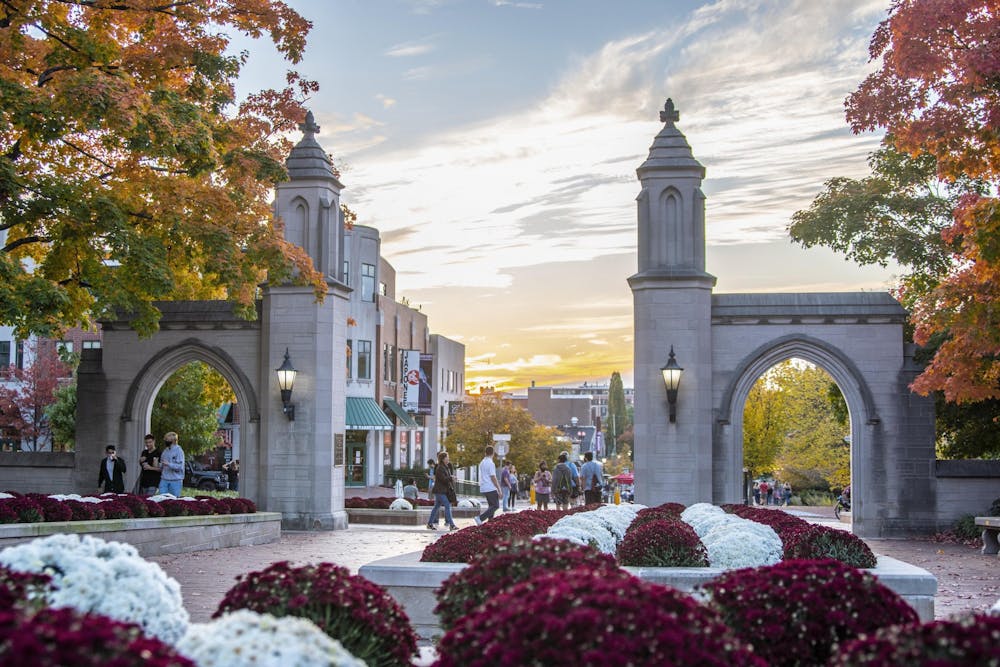It costs about $104,744 to attend IU-Bloomington full-time for four years as an Indiana resident, so I guess that's how much IU paid for me.
It's no secret that IU, like many colleges, has a racially unbalanced student body. By IU's own metrics, minority students only make up 24.9% of the undergraduate population.
Even worse, data shows that only 59.3% of Black IU students graduate within 6 years.
IU needs to address these problems in a way that clearly acknowledges the disparity between minority and white students and their graduation rates. If there is a plan, it is difficult to find. A more diverse campus would be a great start because minority students might feel more inclined to stay on campus to graduation, instead of leaving without a degree.
So how does IU improve its diversity? It buys the attendance of students like me.
The wording may feel ugly, but it’s the truth. It's a transaction. I, alongside my fellow Groups and 21st Century Scholars, wanted an education, and IU wanted better diversity numbers. A more diverse campus means more opportunities for that campus to get increased funding. It's a symbiotic relationship. I get my education, IU gets another nonwhite person in its student body. It's a win-win.
IU isn't alone in this kind of recruitment. A simple Google search shows that there's an endless list of minority scholarships. That doesn’t mean minority students receive more financial aid from scholarships. Nationwide, white students receive 76% of merit-based scholarships despite being only 62% of the student population. White students also, on average, have less student debt after graduation than their Black counterparts. But IU gave me and my fellow Groups and 21st Century Scholars full rides, so those statistics shouldn't mean much to us, right?
Well, looking at the graduation rates for minority students, we see that only 55.4% of Latino, Black, Asian and Native American IU students, across all IU campuses, graduate within 6 years. While this data shows that 90.8% of minority students are staying past freshman year, somewhere along the timeline, these students are leaving.
The high retention rate could be because of programs like Groups Scholars, 21st Century Scholars and Hudson and Holland Scholars, which all help minority students enroll at IU and offer financial aid. It can't be overstated how much value my peers and I receive from these programs, especially because student loan debt often cripples young people entering the workforce, with the total student loan debt across the country reaching the trillions.
However, IU's financial support seems to stop there. In a way, the university tokenizes its minority students, making the symbolic effort of including minorities but not keeping them here to graduation. While some efforts could be genuinely helpful, such as IU's dedication to create an anti-racist university, most of them fall flat.
John Nieto-Phillips, IU’s Vice Provost for Diversity and Inclusion, said IU's culture centers, such as the Neal-Marshall Black Culture Center and La Casa Latino Cultural Center, are great ways for minority students to find communities and support.
"I think there is a tremendous amount of attention and resources that try to get students connected to their community," he said. "Culture centers provide study groups, they provide many different types of programs to engage the students, to support them academically, to support them socially and to ensure that they are well-supported."
While these centers are a great addition to campus, they are more of a respite for students that have issues on campus than a solution for any issues. And if scholarship programs are so good at enrolling and keeping new minority students for two years, and cultural centers are there to help them, what's making them leave before they can graduate?
The university is mired with issues regarding race and treatment of minority students. It took years for the IU Student Government to pass a motion to reflect the diversity of the campus. Professor Eric Rasmusen was lambasted for his racist, sexist and homophobic comments in 2019. Despite public backlash, he remains on payroll with a salary of $198,170 a year, more than the average in-state cost to get a degree in four years. Last year, an IU bus driver demanded a Black man move to the back of the bus. Around the same time, a Black student claimed to be discriminated against on campus by staff at what is now known as the Bill Garrett Fieldhouse.
But I have a full-ride scholarship. That should make it easier to overlook these racist incidents, right? How else would a predominantly white institution like IU encourage minority students to attend its university instead of a historically Black college or university? IU, again, like many universities, gets minority students through the door, but does little to help them after that.
Beyond the racial disparity among students, the disparity among staff is even greater, with faculty being 74.4% white compared to the 68.8% of students being white. This lack of representation leaves many Black and minority students without any staff member they can relate to or seek out for support. IUSG hadn't represented minority students properly until just this year, despite being in operation for about a century. There's a steady stream of stories about racist occurrences at IU. Minority students are leaving without degrees. So what is IU doing about all of this?
Nieto-Phillips said he acknowledges problems with the racial disparity across campus and staff and hopes things grow to be better.
"We have seen progress, and it has been incremental," he said. "In some instances, perhaps it's not been as substantial as we had like, but we're heading in the right direction."
All I want is the same IU experience that my white counterparts get.
At the end of the day, IU bought my attendance. As poorly represented as I am on campus, or as poorly as this campus cares for students like me, I still accepted the deal. IU promised a degree, it's fulfilling that promise, so why do I still have regrets?
CORRECTION: A previous version of this article misspelled Hudson.






